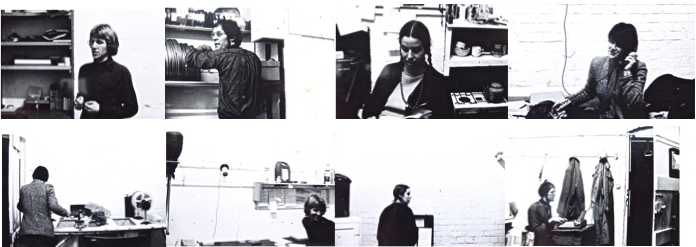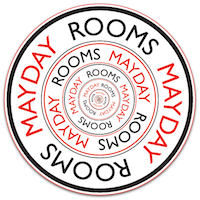
- This event has passed.
Screening: RAILMAN (Four Corners Films, 1976)
April 17, 2015 @ 8:00 pm - 10:00 pm BST

Four Corners at ‘work’ 1975. Image from Wilf Thust’s deposit of historical material at MayDay Rooms, January 2015.
A First Attempt at Collective Film Making – FOUR CORNERS FILMS in 1974
In 1976 Four Corners Films (Joanna Davis, Mary Pat Leece, Ron Peck and Wilf Thust) released Railman, a film concerned as much with the distribution of roles within the film collective as with getting “as close as possible to the life and routines” of an NUR station master. Filmed at Grove Park Station, Lewisham, in south east London, and set against the backdrop of state divestment in transport infrastructure, Railman might be regarded as a modest and experimental corrective to more technically accomplished and officially sanctioned British Transport Films: Rush Hour, Wires over the Border and Accident.
In the spirit of MayDay Rooms’ commitment to opening out historical material onto the present, Wilf Thust, a founder member of the Four Corners collective, will introduce the film and help shape a discussion on the terms and conditions of collective filmmaking as a mode of political or politicising practice, as a form of group process.* Within this frame we might also consider the subject of the film, the station masters’ working life punctuated by British Rail management’s “very successful cooperation” with the unions in cutting the workforce in half over the period of a decade. Railman then takes us into a world where a film collective’s thwarted negotiation with administrative structures turns instead to the more grounded and actually existing world of a BR employee – reinstating voice and agency to everyday actions, thoughts, desires.
Background
In 1974, four London Film School students – Joanna Davis, Mary Pat Leece, Ron Peck and Wilf Thust – agree to work together as part of a course requirement to hand in a film script. They begin by interviewing the PR rep of the National Union of Railwaymen (NUR) and then meet with the course director of the London Film School, Ralph Bond, who in turn secures an interview with Ray Buckton, the general secretary of the rail drivers’ trade union ASLEF. This preparatory work predictably draws the filmmakers into the labyrinth of British Rail bureaucracy, culminating in a failed negotiation to obtain permission to film on BR property on the grounds that an “irresponsible film” or any form of misrepresentation might damage the company’s recruitment drive. This exchange is scripted and then re-staged as the opening sequence of the film. From that point on, the filmmakers move into a more clandestine mode and having identified a location, Grove Park Station in Lewisham, decide to circumvent management and contact workers directly.
As with much Four Corners’ work from this period, the ‘subject’ speaks and Railman is filmed almost entirely in the station master’s place of work, the platform office. In this setting, albeit only for a brief moment, the relationship between the film collective and station master permits the unarticulated a voicing and the unrepresented a hearing.
*Railman is part of a series of activation events – screenings, meetings and discussions – linked to the depositing of a substantial collection of material with MayDay Rooms in late 2013. The results of PLAY-WORK-NON-WORK-PLAY-NON (December 2013) and discussion around the film Where Is The Gaiety? are currently being compiled into a film by Wilf Thust and will be available later in 2015.
